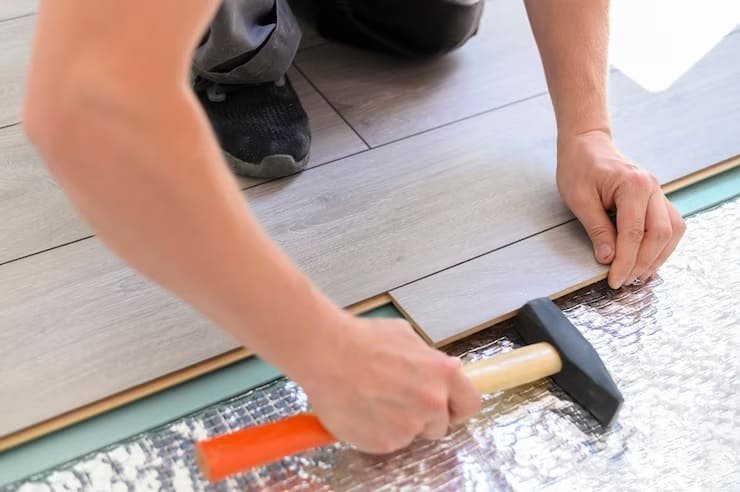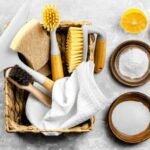Waterproof flooring is an essential consideration for homes with pets, kids, or areas prone to spills and flooding. Choosing the right waterproof flooring option can be important for maintaining a clean, durable, and beautiful home. In this article, we will discuss the top waterproof flooring choices and weigh their unique benefits to help you make the best decision for your needs.
An Introduction to Waterproof Flooring
Before diving into the options, let’s briefly go over what makes flooring “waterproof” and why it matters. Waterproof floorings are engineered with layers of protective coatings or materials that create an impenetrable moisture barrier. This barrier prevents water from seeping through the seams and into the floor’s core or subfloor.
Waterproof floors are a must for bathrooms, kitchens, basements, laundry rooms, and other high-moisture areas. Their water-resistance makes them more durable and easier to clean when inevitable spills or flooding occurs. Waterproof floors won’t warp, buckle, or become damaged when exposed to water.
Many modern flooring options advertise themselves as 100% waterproof, while some are simply water-resistant. True waterproof floors will have rigorous testing data to back up their claims.
Now let’s explore some of the best waterproof flooring choices available today. We’ll cover the pros and cons of each to help you find the perfect fit.
Porcelain and Ceramic Tile
Tile is a tried and true waterproof flooring option, commonly used in bathrooms, kitchens, and basements. Both porcelain and ceramic tiles rate very high on the waterproof scale.
Benefits
- Extremely waterproof and stain-resistant
- Long-lasting durability
- Easy to clean
- High style potential with endless colors/patterns
- Resists humidity and moisture damage
Considerations
- Hard, cold underfoot
- Dropped items can crack or chip tiles
- Professional installation recommended
- Grout lines can stain over time
- Not ideal for walking or standing for long periods
Porcelain tiles tend to be more durable and water-resistant than ceramic and are suitable for high-traffic areas. Smaller grout lines also make porcelain tile floors easier to clean.
For even greater water protection, choose porcelain tiles with rectified edges. This eliminates the lippage that can trap water and gunk between uneven tile edges.
Luxury Vinyl Planks (LVP)
Luxury vinyl plank (LVP) flooring has soared in popularity in recent years as an easy and affordable waterproof flooring option. LVP mimics the look of natural wood or stone flooring with enhanced durability and moisture protection.
Benefits
- 100% waterproof vinyl wear layer
- Dent and scratch-resistant
- Affordable and easy DIY installation
- Extensive style options
- Warm and quiet underfoot
- Durable and kid/pet friendly
Considerations
- Avoid cheap vinyl that can warp
- Seams are not fully waterproof
- Can scuff or fade over time
- Avoid rolling heavy furniture directly on planks
Look for premium LVP flooring with stone-plastic composite or rigid vinyl cores for maximum durability. Brands like Karndean, Shaw Floorte, and COREtec offer excellent waterproof LVP collections. Pay close attention to the product’s wear layer thickness and warranty when choosing.
Sheet Vinyl
Sheet vinyl remains a popular budget-friendly waterproof flooring option. It comes in continuous sheets rather than planks, making installation fairly simple.
Benefits
- Very affordable option
- Easy DIY installation
- Seamless, no-grout floor
- Extensive style choices
- Naturally water and stain-resistant
- Ideal for large spaces
Considerations
- Avoid low-quality vinyls
- Seams are not waterproof
- Can scuff, tear, or fade over time
- Limited texture options
- Not ideal for rolling heavy appliances
For kitchens and bathrooms, look for sheet vinyl with slip-resistant textures built in. Darker sheet vinyl colors can also hide stains and scuffs better compared to very light colors. Consider loose lay sheet vinyls from brands like Armstrong and Shaw for the easiest installation.
Waterproof Laminates
Laminate flooring has evolved to include waterproof options thanks to special protective coatings. Brands like Pergo, Armstrong, Shaw, and Mannington offer waterproof laminate collections.
Benefits
- Waterproof coating resists spills/moisture
- Durable and scratch-resistant
- Easy floating click-lock installation
- Affordable alternative to hardwood
- Extensive wood look options
- Quiet and warmer underfoot than tile
Considerations
- Avoid letting water pool on surface
- Not ideal for rooms with floor drains
- Still vulnerable to major flooding
- Floating installation can move apart over time
- Not suitable for extremely high-moisture rooms
For waterproof laminate flooring, inspect the edges for signs of the water-resistant coating. Also look for aqua defense, hydroxylated polymer, and similar terms when researching water protection. Pergo’s WetProtect and Shaw’s Repel Technology are examples of top waterproof coatings.
Water-Resistant Vinyl Flooring
Certain vinyl flooring options are water-resistant rather than 100% waterproof. These can be suitable for kitchens, basements, and other spaces prone to occasional spills or flooding.
Benefits
- More affordable than tile/LVP
- Easy click-lock floating installation
- Softer and warmer than tile
- Extensive wood/stone look options
- Low-maintenance cleaning
- Durable and scratch-resistant
Considerations
- Not fully waterproof, water can seep into seams
- Avoid excessive or pooling water
- Can fade, stain, or warp over time
- Foam backing traps moisture
- Seams and edges are vulnerable points
Two examples of quality water-resistant vinyl brands are TrafficMaster Allure and Burke Aquatek. Look for vinyl flooring backed with a waterproof membrane or foam underlayment for added moisture protection. Completely waterproof the floors with caulk along all seams and edges.
Epoxy and Polyaspartic Garage Floor Coatings
For industrial-strength waterproofing, consider installing an epoxy coating. Epoxy resins create a thick, glassy surface impervious to water, making them a popular choice for garages, basements, kitchens, and bathrooms. Alternatively, polyaspartic garage floor coating offers similar durability and waterproofing benefits with faster drying times, making it an excellent option for those seeking efficiency without compromising performance.
Benefits
- Extremely durable and waterproof
- Stain, scratch and slip-resistant
- Seamless installation
- High gloss for a stylish look
- Extensive color options possible
- Withstands heavy impacts
Considerations
- Professional installation required
- Expensive compared to other options
- Can yellow over time
- Can be slippery when wet
- Improper preparation leads to cracking
Polyaspartic and polyurea coatings provide similar durability and waterproofing to epoxy with faster drying times. Prep work is important before installation to ensure proper bonding. Consider adding anti-slip additives for increased traction.
Rubber Floor Tiles
For playrooms, gyms, and other active spaces, rubber floor tiles present a kid-friendly waterproof option. Made from recycled rubber, these interlocking tiles are naturally waterproof and hardwearing.
Benefits
- Naturally waterproof material
- Cushioned support underfoot
- Safe, slip-resistant surface
- Easy DIY installation
- Extremely durable and kid/pet-friendly
- Sound and impact absorbing
Considerations
- Limited style/color options
- Seams allow moisture through
- Can fade or stain over time
- Heavy furniture can indent surface
- Can pick up pet hair/dust
Popular rubber floor tile brands include Flor, Ecore Athletic, SnapSports, and American Floor Mats. Choose low-profile tiles no more than 1/4″ thick for easy wheelchair maneuvering. Look for interlocking edges that tightly connect tiles together.
Resilient Vinyl Sheet Flooring
For heavy commercial applications, resilient sheet vinyl flooring offers supreme durability and waterproofing. Brands like Tarkett, Johnsonite, and Ardex provide commercial-grade options.
Benefits
- Made for heavy commercial use
- Extremely durable and dent-resistant
- Seamless, no-grout installation
- Slip-resistant options available
- Broad color/pattern selections
- Easy to sanitize and clean
- Ideal for healthcare settings
Considerations
- Professional installation recommended
- Expensive, starting around $5/sq. ft
- Can be noisy and echo
- Fades, stains over time
- Not suitable for residential use
These solid vinyl floors are composed of layers of PVC vinyl, binders, and stabil. These solid vinyl floors are composed of layers of PVC vinyl, binders, and stabilizers fused together into one durable, seamless surface. The layers include a clear vinyl wear layer, decorative vinyl layer, and backing layer. Some include additional cushion layers for comfort underfoot.
Resilient sheet vinyl stands up to heavy foot traffic, indentation, chemicals, and routine cleaning. It inhibits the growth of bacteria and mold. The seamless installation provides waterproof protection with no grout lines or edges for moisture to penetrate.
Proper floor prep is important before installation. Subfloors must be smooth, dry, and securely fastened. Professional installers use techniques like heat welding to fuse seams together for added waterproofing.
Choose slip-resistant textures or add grip strips for commercial and healthcare environments. Darker colors also hide scuffs, scratches, and stains.
Loose Lay Luxury Vinyl Planks
Loose lay LVP provides effortless DIY installation with patented locking mechanisms that snap planks together. The loose lay format allows floors to be installed over existing surfaces.
Benefits
- Easy click-together floating installation
- No adhesive needed
- Installs over existing floors
- 100% waterproof vinyl surface
- Affordable, starting under $2 per sq. ft.
- Extensive wood and stone looks
Considerations
- Loose planks can shift apart over time
- Avoid rolling heavy appliances directly over
- Improper prep leads to planks popping loose
- Still prone to scratching and fading
COREtec, Shaw, Karndean, and other brands offer quality loose lay waterproof LVP. Always carefully prepare the subfloor and follow all manufacturer’s installation instructions to prevent planks from separating. Choose textured surfaces for added traction.
Waterproof Hardwood Flooring
Several engineered hardwood brands now offer flooring enhanced with waterproof coatings and cores. This provides the beauty of real wood with added protection.
Benefits
- Warm, natural hardwood look
- Factory applied waterproof finish
- Durable construction resists moisture
- Long-lasting with proper care
- Ideal balance of beauty and protection
- Improved stability for humidity resistance
Considerations
- Avoid excessive water exposure
- Water can still penetrate unfinished edges
- Needs special maintenance products
- Only protects surface, not joints
- Costs more than traditional hardwood
Shaw’s ArmorMax, Bruce’s Protex, and Bona’s Titanium finishes are examples of waterproof coatings for hardwood floors. These provide protection while maintaining the wood’s breathability. Always check manufacturer ratings for subfloor moisture limits.
Glass Floor Tile
For a dramatic look, glass floor tile provides an ultra-glossy and waterproof flooring material. Glass tiles are extremely hard and scratch-resistant.
Benefits
- Completely waterproof and stain-proof
- Intensely durable and scratch-resistant
- Antibacterial and chemical resistant
- High-end, stylish appearance
- Color and finish options
- Adds brightness and depth
Considerations
- Hard and slippery underfoot
- Grout staining can be difficult to remove
- Challenging DIY installation
- Dropped items can shatter tiles
- Small tiles prone to cracking
Popular brands like Mercury Mosaics and Fireclay Tile offer gorgeous glass floor tile selections. Combine different colored tiles for custom designs. Choose textured tiles or matte finishes for grip. Larger format tiles are beginner-friendly.
Final Takeaways
When reviewing your flooring options, think about your priorities. Do you need to accommodate pets or kids? What about budget? Traffic and noise levels in the home? Keep all lifestyle factors in mind.
Be sure to thoroughly research the quality and construction of any waterproof flooring. Cheaper vinyls and laminates can warp and fail. Investing in premium materials upfront is wise.
With proper installation and care, waterproof floors can last for decades. Follow all manufacturer maintenance recommendations like using cleaners made specifically for your floor type.
Hopefully this overview gives you confidence in choosing the ideal waterproof flooring for your unique needs. Protect your home from spills and flooding while adding style with any of these top-rated options.




No Comment! Be the first one.